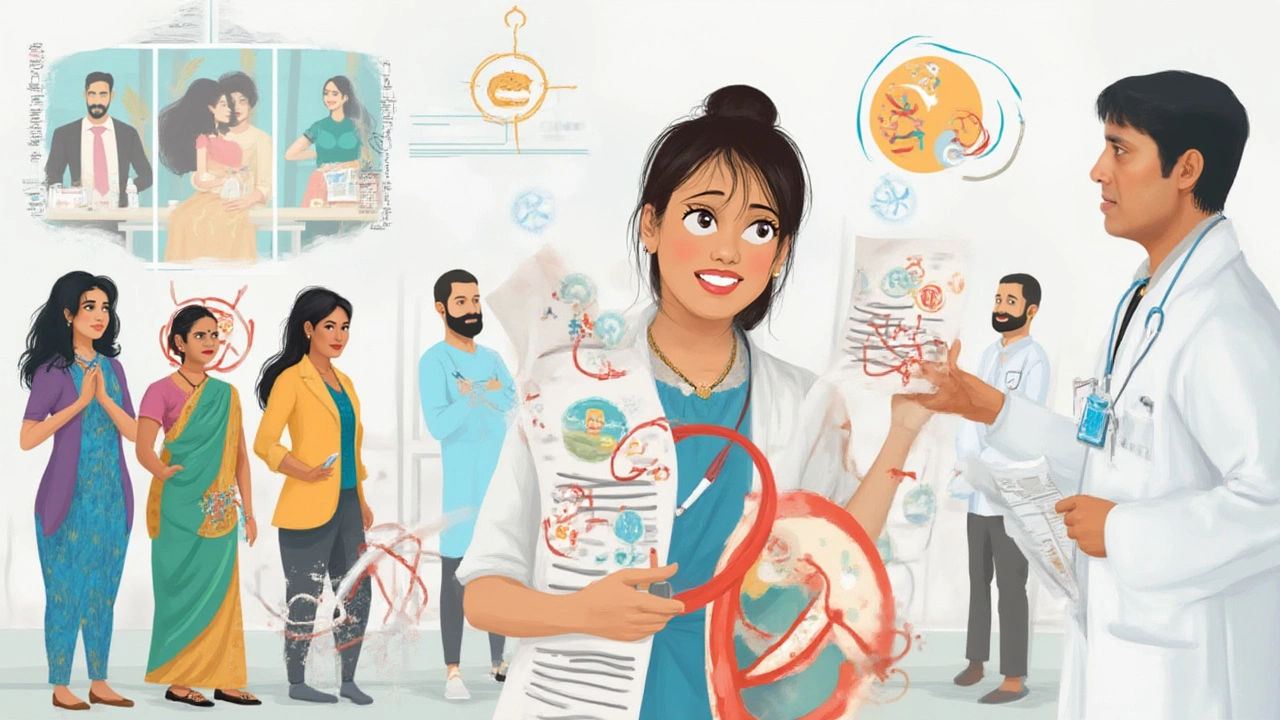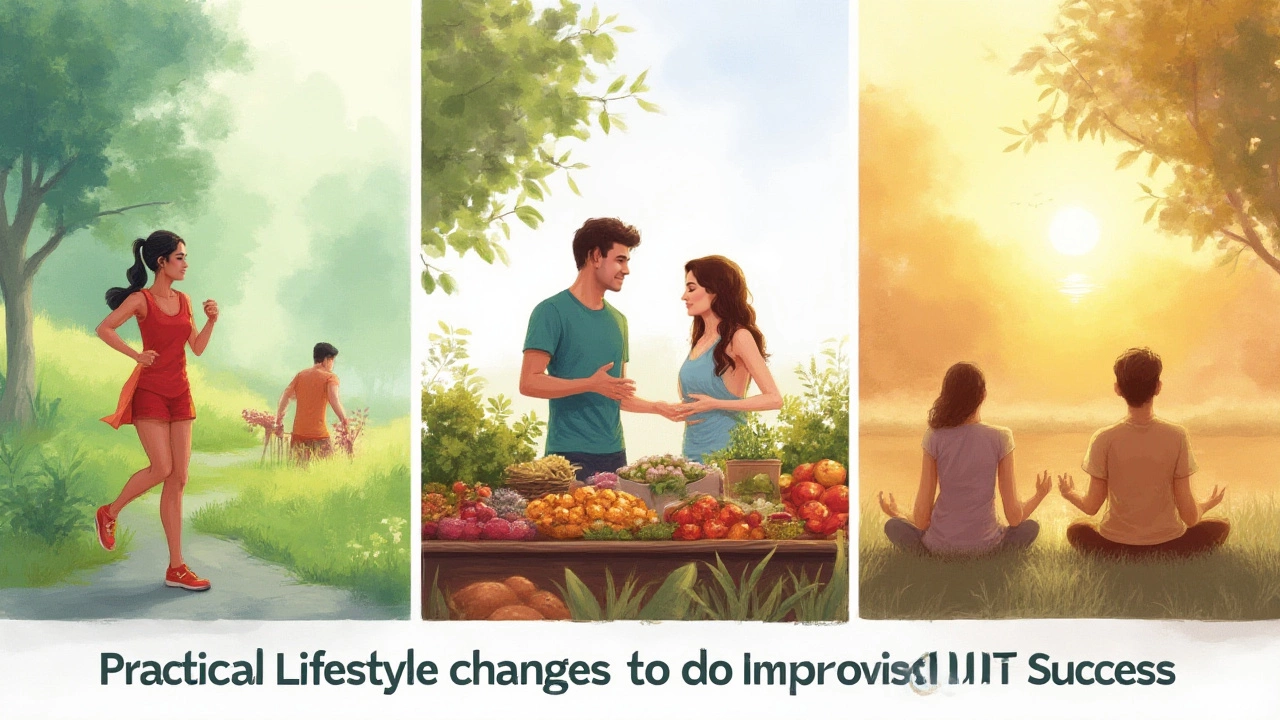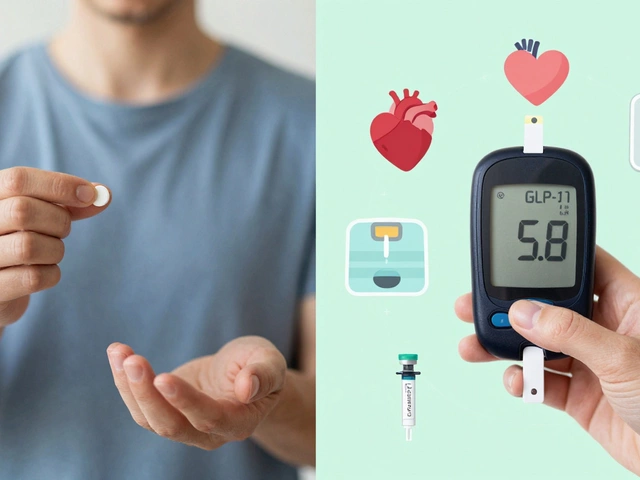If you ask someone who’s actually tried to start a family through IVF, you won’t hear dreamy stories of instant success. Instead, you get the real deal—forms, tests, and rules. Here’s the truth: not everyone can just walk into a clinic and get started. There’s a checklist, and yes, there are reasons you can be turned away. Grab a coffee and let’s talk openly about the factors that can disqualify someone from IVF, and what you might be able to do about it.
Medical Reasons That Stop IVF Before It Starts
This is the tough part. No clinic wants to put anyone through endless appointments, shots, and bills unless there’s a real shot at success. So, let’s get specific. Age is often the first thing discussed. Most clinics use an upper age limit for women around 45 years, because success rates plummet after that. It isn’t just about years lived—egg quality and quantity start dropping sharp after age 35. One massive dataset from the Society for Assisted Reproductive Technology found that live birth rates drop from roughly 27% for women under 35 to less than 4% for women over 43. There just aren’t miracle drugs to fix old eggs yet. For men, age tends to matter less, although sperm quality can start to dip a bit after 50.
Some conditions are automatic stops. If there’s ovarian failure where no eggs are left, clinics usually won’t proceed with your own eggs—donor eggs become the option. Women with an untreated severe uterine abnormality (think large fibroids distorting the cavity, a completely scarred uterus, or certain birth defects) may be disqualified because an embryo can’t implant or grow properly. Persistent, unmanageable illnesses like active cancer, untreated tuberculosis, or any serious heart disease can also be grounds for saying no. Why? Because pregnancy piled on top of these makes things risky—sometimes life-or-death risky.
Fertility drugs and anesthesia also present their own set of problems. If someone’s allergic to the most common IVF meds, or if they’ve had a dangerous reaction to anesthesia, it’s a red flag. Chronic, poorly controlled autoimmune diseases such as lupus can put both the mother and fetus in danger, so clinics get very careful in these cases, sometimes pausing things until the disease is managed for at least six months. Severe clotting disorders—where your blood clots way too easily—are risky because IVF meds can make it worse. This isn’t a maybe; it’s a major reason many are turned away.
Let’s get blunt about BMI. While it might feel unfair, many clinics use a BMI cutoff as high as 35 or 40. That’s because a higher BMI can mean more medication is needed, higher rates of miscarriage, and serious problems under anesthesia. On the other end, those with a BMI under 18.5 might also get shut out due to higher odds of complications. Clinics aren’t judging—they’re looking at hard numbers and what they see in recovery rooms every day.
For both men and women, untreated sexually transmitted infections (HIV, hepatitis B or C, syphilis) are usually a no-go until treated, mainly to protect laboratory staff and other patients. Smoking and substance use are hot topics, too. Some clinics require proof that you’ve kicked the habit for months before they’ll treat you, since smoking can slash success rates by 50%—and that’s a stat most clinics take pretty seriously.
Here’s a quick reference table on common disqualification medical factors for IVF:
| Factor | Typical Limit | Reason for Disqualification |
|---|---|---|
| Female Age | Over 45 | Low pregnancy chances, high complication risk |
| BMI | Over 35-40 | Higher anesthesia and complication risk |
| Uncontrolled Medical Illness | Active | High risk to health and child |
| Severe Uterine Abnormality | Any | Limits embryo implantation |
| Untreated STIs | Any | Lab/patient safety, reduced IVF success |
| Substance Abuse | Ongoing | Impact on success, pregnancy safety |

Mental, Emotional, and Lifestyle Factors That Matter
So what if you check the health boxes? That’s only half the story. IVF isn’t just about the science—it’s also about being ready, emotionally and practically. This is where things can get tricky, because some people are surprised to learn that counseling is actually a formal part of the screening process, not a side dish.
Psychological evaluations aren’t about being judgmental. Clinics want to make sure you understand what you’re signing up for. IVF involves needles, procedures, waiting, hope, despair, and sometimes grief—not just for the parents, but for relationships too. If someone is dealing with severe, untreated mental health issues like severe depression, psychosis, or active self-harm, clinics often hold off until there’s documented stability. This directly affects your ability to cope with the roller-coaster ride IVF brings. According to a 2023 study in Human Reproduction Update, patients suffering extreme stress or unmanaged mental health conditions had notably lower IVF success rates—proof it’s not just about willpower.
Current substance abuse—including heavy drinking, marijuana, or other drug use (recreational, not medicinal)—is cause for a hard pause. If you’ve tried and failed to quit, clinics usually want you to get help first. If you’re currently being treated for addiction, some programs need a psychologist’s clearance. The same goes for partners in couples, since sperm and eggs both get hammered by these substances.
Sometimes it’s about your support system. IVF isn’t a solo sport, even for single parents. Clinics want to know you have people in your corner, because the process is draining and unpredictable. If a doctor feels that you’ll be isolated, unsupported, or unable to handle potential disappointment, you may be encouraged to wait or seek counseling.
Your living environment can be a deal-breaker. This sounds intense, but if you don’t have stable housing or are in a dangerous situation (domestic violence, legal uncertainty), most programs will hold off. They want to make sure any child born has a secure place to land. Nobody likes to wait, but these rules exist because IVF is only the first step—the baby’s well-being comes next.
It’s not just about what’s on paper. Many programs ask applicants to write a short statement about why they want a child and what parenthood means to them. This isn’t to trip you up or judge your values—it’s to help you pause and be honest with yourself, because IVF works best when your head and heart are both on board.
Insurance and finances play their part. Many countries—and almost every clinic—look at your ability to pay for the full cycle, including medications, monitoring, and additional procedures (like ICSI or genetic screenings) if needed. If you start, run out of funding, and can’t finish, that’s tough for everyone. Some places require proof of coverage or a payment plan before they book your first appointment.

Clinic Policies, Ethics, and Unspoken Deal-Breakers
Medical facts aside, every clinic has their own rules—sometimes quirky, sometimes frustrating, always based on experience and the law. For example, some clinics refuse to treat couples with a long history of legal disputes or domestic violence. Others won’t accept patients with criminal records related to child abuse or neglect. These rules run deeper than science—they’re about ethics and liability. Many clinics now use background checks, especially in the US and UK, to look for anything that could put a future child at risk.
Single parents, men, and LGBTQ+ couples see varied policies, depending on where you live. Most places in Europe and North America are getting inclusive, but some clinics (or even entire countries) have restrictions. For example, France and Spain only recently opened IVF to single women, and some clinics in India still require a marriage certificate for heterosexual couples. Who counts as "eligible" sometimes comes down more to location than biology.
Egg and sperm donor requirements set their own bars high. Donors are screened for genetic diseases, infectious diseases, mental health history, and—you guessed it—age caps, usually younger than 35 for egg donors and under 50 for sperm donors. Some countries require psychological counseling for donors, just to make sure everyone knows what they’re agreeing to, especially if donor-conceived kids reach out years later.
You might be surprised to learn that embryos created with donor eggs/sperm face extra screening. Some clinics avoid mixing donors from different ethnic groups unless both recipients request this specifically, to avoid legal headaches or social confusion. They also scan for known genetic risks (sickle cell disease, cystic fibrosis, thalassemia) based on your background, to avoid passing on conditions that could significantly lower a child’s quality of life. Genetic counselors are usually brought in for complicated cases, and they have veto power if the risks look too high.
The number of previous failed IVF cycles can also be a deal-breaker. If someone’s had 5 or 6 failed cycles—even if science hasn’t pinpointed why—many clinics recommend stopping to avoid emotional, financial, and physical burnout. A 2022 report in Fertility and Sterility showed that after 3 failed cycles, the chances of success on later cycles dropped sharply for women over age 40, making doctors hesitate to keep trying.
Here are a few tips if you’re worried about getting the boot:
- Get a head start on healthy living—quit smoking, cut alcohol, manage your weight, and keep chronic illnesses in check before even booking a consult.
- Get your mental health sorted—don't be shy about therapy or counseling. Clinics appreciate honesty over bravado.
- Collect your medical records, vaccination history, and results from previous fertility tests. Being prepared speeds up the process.
- Ask about clinic-specific policies upfront—age limits, relationship requirements, insurance coverage, and previous IVF failures.
- Keep your mind open to donor eggs, sperm, or surrogacy, especially if you’re approaching a medical red line.
Nobody likes to read about things that can get them disqualified, but knowing what clinics are looking for is smart. It saves you time, money, and, most crucially, heartache. If one place says no, sometimes another might say yes—with the right plan, mindset, and maybe a little luck. That’s how the world of IVF works: tough, unpredictable, but sometimes exactly what you need to turn a dream into a heartbeat.






